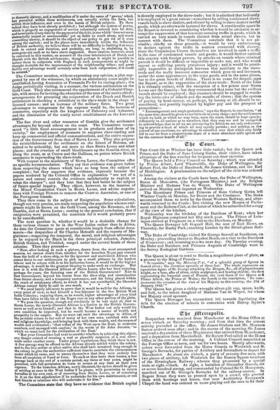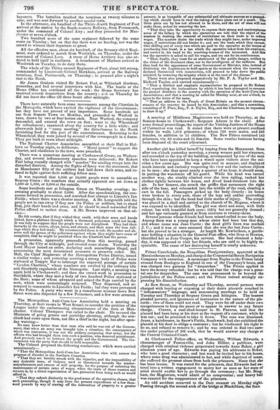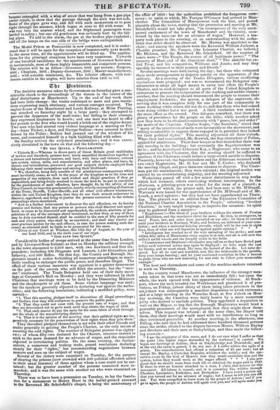2Ebt .11111Eiropolis.
Despatches were received from Manchester at the Home Office at seven o'clock on Saturday morning ; and from that time the utmost activity prevailed at the office. Sir James Graham and Mr. Manners Sutton arrived soon after ; and in the course of the morning Sir James received a deputation of three Magistrates that arrived from Manchester, and a deputation from Macclesfield. Sir Robert Peel called at the Horns Office in the course of the morning. A Cabinet Council assembled at the Foreign Office at noon, and sat for two hours. Shortly afterwards, orders were forwarded from the Horse Guards to Woolwich and St. George's Barracks, for parties of Artillery and Grenadiers to depart for Manchester. At about six o'clock, a party of seventy-five men, with two pieces of artillery, left Woolwich for the Euston Square terminus of the Birmingham Railway ; whence they prcceeded by a special train at eight &clock. At eight, a battalion of Grenadier Guards, six or seven hundred strong, and commanded by Colonel Sir 0. Honeynnin, marched out of St. George's Barracks for the railway-station. bl Regent Street they were so pressed upon by a crowd, who greeted them with hootings and hisses, that near Archbishop Tennyson:a Chapel the band was ordered to cease playing and the men to fix their
bayonets. The battalion reached the terminus at twenty Minutes to nine, and was sent forward by another special train. In the afternoon, six hundred of the Thirty-fourth tegiment of Foot arrived at the station by the South-western Railway, from Portsmouth, under the command of Colonel Airy ; and they proceeded for Man- chester at seven o'clock.
Two hundred more of the same regiment followed by the same route on Tuesday ; but on that day there woe no hooting, nor was the crowd to witness their departure so great.
All the effective men, about six hundred, of the Seventy-third Regi- ment, were ordered to march from Woolwich, on Thursday, under the command of Colonel Love. A troop of Horse Artillery was also or- dered to hold itself in readiness. A detachment of Marines arrived at Woolwich on Tuesday, to do duty there.
The whole of the Thirty-second Regiment of Foot, about 900 strong, commanded by Lieutenant-Colonel Markham, arrived at the Railway terminus, front Portsmouth, on Thursday ; to proceed after a night's rest to the North.
Sir James Graham visited Sir Robert Peel, at Whitehall Gardens, yesterday, and had several interviews with him. The bustle at the Home Office has continued all the week : the Home Secretary has received several deputations from the country ; and on Thursday he did not leave the office till three hours after midnight.
There have naturally been some movements among the Chartists in the Metropolis, which have excited the vigilance of the Government ; but they have not proved of any importance. Some hundreds set out from Somers Town on Monday, and proceeded to Watford in vans, drawn by two or four horses each. Near Watford, the company descended, and entered the town on foot ; went to the Wheatsheaf for refreshment ; sauntered about the country for a little while: and afterwards held a " camp meeting," the disturbances in the North furnishing food for this part of the entertainment. Returning to the Wheatsheaf, they were joined by several of the townspeople in a dance. They got back to town about midnight.
The National Charter Association assembled at their Hall in Hol- born on Tuesday night, to deliberate. "Moral power" to support the Charter, and obedience to the laws, were preached.
There was a numerous meeting at Clerkenwell Green, on Wednes- day, and several inflammatory speeches were delivered ; Sir Robert Peel being roundly charged with "murder," for sending troops into the disturbed districts. Among the flights of fancy was the statement, that at Manchester fifty of the soldiers had laid down their arms, and re- fused to fight against their suffering fellow men.
It was reported that 8,000 or 10,000 people were to assemble on Stepney Green : the numbers that actually appeared are set down at 1,200 or 1,500, or 2,000 at the outside.
Some hundreds met at Islington Green on Thursday evening ; in- creasing gradually to about 3,000. After due speechmaking, the con- course formed in procession, and marched four abreast to Lincoln's Inn Fields ; where there was a shorter meeting. A Mr. Longsniith told the people not to run away if they saw the Police or soldiers, but to stand firm, join their hands and arms, and he should be much astonished if the Police offered to molest them. A. Mr. Brown improved on that ad- vice— He felt certain, that if they wished they could, with their arms and hands linked, form a phalanx through which a thousand policemen could not break. It was folly to suppose that the people were not disciplined. They had their barracks in the courts, alleys, lanes, and streets, and their arms the iron rail- ings which they had made. Ile recommended them to take the number and ob- serve well the person of the policemen against whom they might have cause of complaint, that he might be punished when the Chartists had the power.
A procession, apparently proceeding from this meeting, passed through the City at midnight, and created some alarm. Yesterday the Lord Mayor issued an order, declaring such assemblages illegal, and announcing the most determined measures to preserve order. Mr. Hall, the Chief Magistrate of the Metropolitan Police District, issued a similar notice ; and yesterday morning a strong body of Police were stationed at Temple Bar to intercept the expected passage of certain "London Chartists," whose numbers are swelled by the ordinary idle and disorderly vagabonds of the Metropolis. Last night, a meeting was again held in Clerkenwell ; and then the crowd went in procession to Smithfield, where they met a body of two hundred Police stationed at the Bars ; some of whom advanced and seized the flags carried by the mob, which were unresistingly resigned. They dispersed, and at- tempted to reassemble in Lincoln's Ion Fields ; but they were prevented by the Police. A party who went in a tumultuous manner down Bow Street were also dispersed by a few Policemen, and a few were arrested.
The Metropolitan Anti-Corn-law Association held a meeting on Thursday, at their rooms in West Strand, to consider the position of the League under the embarrassing circumstances of the riots at Man- chester. Colonel Thompson was called to the chair. He accused the Ministers of going grouse and partridge shooting, although the mis- chiefs had come upon them, not like a thief in the night, but after open- day warning— No man knew better than that man who said he was not of the Govern- ment, that when an army was brought into a situation, the consequence of which was starvation, it was not the soldiery composing that army, but the officers who had brought them into such a position, who deserved punishment. And precisely was it so between the people and the Government. The Go- vernment was the party that should be held responsible. The Colonel proposed the following resolutions ; which were carried unanimously- " That the Metropolitan Anti-Corn-law Association view with sorrow the progress of disorder in the Northern Counties. "That they are forcibly struck with the injustice, and the impossibility of any desirable issue, of violence used or threatened towards the master- manufacturers and owners of mill property, for the purpose of enforcine the maintenance of certain rates of wages, when the trade of those masters and owners is, by a direct organization of law, prevented from being such as would afford it.
"That they submit distinctly to the good sense of the operative classes, that such proceeding, though it may force the present expenditure of a few thou- sand pounds by way of staving off the destruction of property to a greater amount, is as incapable of any substantial and ultimate success as a proceed- ing which should have in view the taking of three pints out of a quart. The three pints are by law not allowed to be there, and the art of man will not make them, unless by removing the law. "That they take the opportunity to express their strong and contemptuous sense of the fallacy by which the operatives are told that the object of the masters in desiring the removal of restrictions on their trade is to reduce wages. The masters desire the trade which they might have, under improved wages, if restrictions did not hinder it ; and not the trade which they cannot, One shilling out of every two which are paid to the operative as the means of purchasing him bread, is a tax which the operative takes from his employer, and carries in his hand to the receiving-houses of the interested. And this' tax the operative is asked to call his wages, and cry out for its continuance. "That, finally, they trust for an abatement of the public danger, neither to the virtue of the dominant class, nor to the intelligence of the sufferers. But they look for the appearance of some Government or Minister, who, instead of dismissing the Legislature to field-sports at the moment when the country is declared threatened with insurrection, will proceed to take down the public mischief, by removing the iniquity which is at the root of the disease."
These were also proposed respectively by Mr. P. A. Taylor and Mr. Richard Taylor, and carried unanimously-
" That a distinct and emphatic representation be prepared to Sir Robert Peel, repudiating the insinuations by which it has been attempted to connect the present disorders in the country with the operation of the Anti-Corn-law Associations; and that a meeting be called for Monday next, at one o'clock, to agree to the terms of the same. " That an address to the People of Great Britain on the present circum- stances of the country be issued by this Association ; and that a committee, consisting of F. Place, Esq., P. A. Taylor, Esq., and the Chairman, be requested to draw it up."
A meeting of Middlesex Magistrates was held on Thursday, at the Session-house in Clerkenwell ; Sergeant Adams in the chair. After some formal proceedings, the report of the Visiting Justices of the House of Correction was read. It stated that there were at present confined within its walls 1,078 prisoners; of whom 789 were males, and 289 females, in addition to 11 children. The New Prison contained 145 prisoners, viz. 90 males and 55 females. Some routine business having been disposed of, the court adjourned.
Another girl has killed herself by leaping from the Monument. Soon after ten o'clock yesterday morning, a young woman paid her sixpence, and ascended to the top of the building, accompanied by one of the men who have been appointed to keep a watch upon visiters since the sui- cides a few years ago. She was quite cool in manner, and displayed much interest and curiosity respecting the view and the various objects to be seen : she thus spent nearly a quarter of an hour, it should seem, in putting the watchman off his guard. While his head was turned another way, she nimbly climbed over the iron railing, tucked her clothes tightly between her knees, and dived head-foremost into the air. In her descent, she struck the griffin that surmounts the right side of the base, and rebounded into the middle of the road, clearing a cart in the fall. Passengers picked up the body directly : its bones were broken in every part, those of the legs and ankles protruding through the skin ; but the head had little marks of injury. The corpse was placed in a shell and carried to the church of St. Magnus, where it was exposed to be identified. The girl was short and stout, with little colour, but with beautiful dark eyes ; tidily but not genteelly dressed ; and her age variously guessed at from nineteen to twenty-three. Several persons whose friends had been missed called to see the body. Among them was a young man whose sister had been lost that day, and whose name was Jane Currie: the dead girl's linen was marked J. C.; and it was at once assumed that she was the lost Jane Currie ; but she proved to be a stranger. At length Mr. Rowbotham, a gentle- man holding a situation in the General Post-office, who lives at Hoston, identified her as Jane Cooper, his servant. She had obtained a holy- day, it was supposed to visit her friends, who are said to be highly re- spectable. The cause of her destroying herself is totally unknown.
Prince Casteleicala, the Neapolitan Plenipotentiary, appeared at the Mansionhouse on Monday, and charged the Commercial Steam Navigation Company wii h extortion. A messenger from Naples to the Prince lately crossed from Boulogne to England in one of the Company's boats, and was charged two guineas for "despatches." The Prince applied to have the money refunded ; but he was told that the charge was a gene- ral one for despatches. The case was pronounced to be beyond the jurisdiction of the Police-court ; and the Prince retired strongly ex- pressing his dissatisfaction.
At Bow Street, on Wednesday and Thursday, several persons were charged with bearing or exposing at their doors placards couched in " inflammatory " language, and announcing meetings to be held on Tuesday and Thursday at Stepney Green and Islington. The bearers pleaded poverty, and ignorance or inattention to the nature of the pla- cards: two of them could not read. They were let off under their own recognizances to keep the peace or to appear in answer to any future charge. Craven, a coal-shed-keeper in St. Pancras, said that the placard had been hung at his door at the request of a customer, while he was out ; and he promised to take it down. The case was dismissed. Jeans, a hairdresser, in Snow's Fields, Southwark, had also exhibited the placard at his door to oblige a customer ; but he vindicated his right to do so, and refused to remove it ; and be was ordered to find two sure- ties under penalties of 20/. each, that he would answer any charge at the Central Criminal Court.
At Clerkenwell Police-office, on Wednesday, William Edwards, a cheesemonger of Pentonville, and John Hillier, a publican, were charged with criminal violence perpetrated towards Anne Baker, a girl nineteen years of age. Edwards was paying his addresses to Baker, who bore a good character ; and last week he invited her to his house, where some drag was administered to her, and while deprived of sense, she suffered the grossest abuse from both the prisoners. Since that she has been insane. It was stated for the prisoners, that Edwards had en- tered into a written engagement to marry her as soon as her state of mind should enable her to go through the ceremony ; but Mr. Big- ham, the Magistrate, would admit of no compromise ; and heavy bail was exacted for the reappearance of the prisoners.
An odd accident occurred to the Dart steamer on Monday night. Passing through the second arch of the bridge at Blackfriars, the faun became entangled with a wisp of straw that was hung from a gas-pipe under repair, to show that the passage through the arch was not safe. Some of the pipes gave way, and fell with such momentum as to pass right through the steamer, which began at once to fill with water. It was run into the nearest wharf, and the frightened passengers were landed in safety ; but one old gentleman was seriously hurt by the fall- ing pipes. To add to the alarm, the gas at the broken pipe exploded ; and all the lamps on the east side of the bridge were extinguished.
The Model Prison at Pentonville is now completed, and it is under- stood that it will be open for the reception of inmates early next month. In the mean time, all the appointments will be filled up. The applica- tions for the principal situations have been very numerous. Upwards of one hundred candidates for the appointment of Governor have sent in testimonials, most of them highly respectable and competent persons. The salaries will be as follow—Governor, 600/. per annum ; Surgeon, 400L; Chaplain, 3001.; Deputy-Governor, 2001.; Master-manufacturer, 2001.; with suitable residences, &c. The inferior officers, with resi- dences outside in the angles, will have salaries from 120/. to 601.




























 Previous page
Previous page